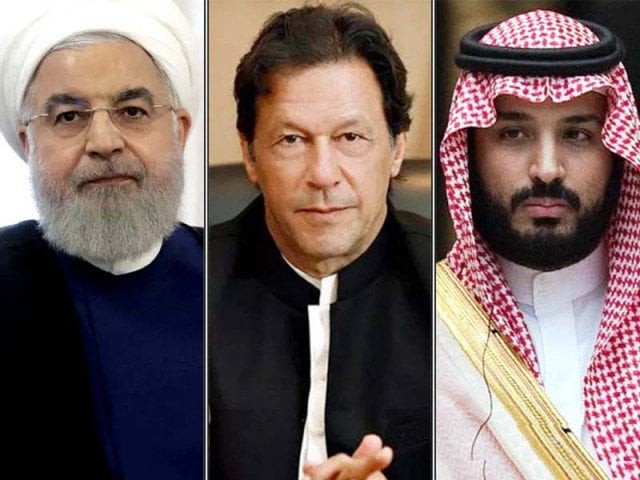The Saudi-Iran conflict and Pakistan
Since the early 1900s, the region has remained embroiled in myriad crises, wars, coups and poverty

PHOTO: FILE
A tragic corollary of the much-lamented Arab Spring, the Yemen crisis reached a crescendo in 2012 when the beleaguered dictator, Ali Abdullah Saleh, handed over the reins of government to his vice president, Abdrabbuh Mansour Hadi. However, Hadi was also deposed in 2015 when the Houthis overran the capital Sanaa. A horrified Riyadh fabricated an eight-nation coalition, buttressed by the US, the UK and France, and initiated a ferocious bombing campaign against the Houthis in order to reinstate Mr Hadi and counter Iranian influence in the country. The fighting led to mass killings and triggered the world's largest humanitarian catastrophe.
Since the early 1900s, the region has remained embroiled in myriad crises, wars, coups, generation of petro-money on a grand scale and poverty replication on an even grander scale. It is a contemporary El Dorado where the Middle Eastern version of the Great Game is being played by Saudi Arabia, Iran, the US and others. Battle-hardened non-state entities like the Hezbollah, the Houthis and various Iraqi militias are also part of the potpourri. The swashbuckling Abqaiq-Khurais assault, a watershed event in the chequered history of the Middle East, should be seen as a peculiarity of this geopolitical matrix. Its shock and awe testify to the meticulousness of the offenders who decimated Saudi Arabia's much-touted global oil management and distribution system in a bizarrely nonchalant manner.
How should Riyadh react to this provocation? When juxtaposed with the lackadaisical US response to the attacks, a Saudi strike against Iran would appear reckless. A politically-besieged President Trump would not like to stir up a military hornet's nest in the region. The Gulf states, though rattled by the sheer brazenness of the attacks, also seem averse to the eruption of a full-scale war as it could damage their energy infrastructure, obstruct maritime cargo lanes and dramatically ratchet up the cost of the war. Diplomacy should, therefore, take centre stage. This is where Pakistan comes into the picture.
A few hiccups notwithstanding, Islamabad's association with both Tehran and Riyadh has remained meaningful. Prime Minister Imran Khan is trustworthy, has no axe to grind and is flamboyantly spontaneous. His remarkable speech at the 74th UNGA session has manifestly added to his stature and he can approach both Tehran and Riyadh self-assuredly.
Indeed, the Prime Minister promptly initiated a diplomatic move in this regard after President Trump invited him to intervene in the matter. He met Iranian President Hassan Rouhani on the sidelines of the UNGA session in September and then held talks with Prince Mohammed bin Salman in Riyadh. It is now time to move up a gear.
The Prime Minister should present a multi-pronged diplomatic plan to the Saudi and Iranian leadership, UN Secretary General Antonio Guterres and President Trump.
The Secretary General should ask the Security Council, which has the requisite legal authority, to nominate a team of impartial weapons and forensic investigators with an unambiguous mandate to probe the Abqaiq and Khurais attacks. This is essential as no action should be taken against anyone without irrefutable evidence. Interestingly, the Secretary General had himself proposed the creation of such an entity to investigate the tanker attacks in the Gulf in June. The same mechanism could be employed now.
A UNSC-sponsored ceasefire should take effect in war-stricken Yemen whereby both Riyadh and the Houthis should stop targeting each other. Likewise, oil tankers in the Gulf waterways should not be attacked by the parties to the conflict. A missile attack on an Iranian tanker near Jeddah last week is a case in point.
As a parallel development, aid should be allowed to reach the 14 million distressed Yemenis to avert a catastrophic humanitarian crisis. A separate comprehensive plan should be devised in this connection with the help of the UN Office for the Coordination of Humanitarian Affairs (OCHA), the UN Human Rights Council, the Office of the United Nations High Commissioner for Human Rights (OHCHR), Unicef, the International Committee of the Red Cross (ICRC) and the International Rescue Committee (IRC). Evidently, the success of the peace initiative greatly depends on the efficacy of the humanitarian endeavour in Yemen.
During the investigations, Prime Minister Imran Khan should visit Iran and Saudi Arabia to keep the leadership of the two countries updated. A core group of senior Pakistani diplomats should assist him.
Once the investigation report is presented to the Security Council, further action could be contemplated as per the edicts of International Law.
This peace initiative by Prime Minister Imran Khan has the capacity not only to tame the chaos in the Middle East but also to catapult Pakistan to a position of eminence and respect. Pakistan possesses the requisite diplomatic finesse to act as the diplomat-in-chief of the Muslim world. It is time to put that finesse to good use.
The writer is a global affairs, public policy and security analyst, and a senior civil servant.















COMMENTS
Comments are moderated and generally will be posted if they are on-topic and not abusive.
For more information, please see our Comments FAQ